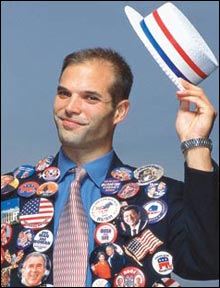Although his last steady gig was writing for the Web, Thompson himself was dubious, at least early on, of that ever-growing galaxy of online opinion. “There is a line somewhere between democratizing journalism and every man a journalist,” he told the Atlantic in 1997. “You can’t really believe what you read in the papers anyway, but there is at least some spectrum of reliability.”

YOUNG GONZ: Rolling Stone reporter (and Phoenix contributor) Matt Taibbi is considered a potential heir to Thompson’s throne. |
Craven new world
Reliability. A rich word coming from someone who wrote about Bill Clinton in the 1992 campaign for Rolling Stone, describing the candidate’s behavior at the dinner table thusly: “He grasped the wicker basket of French fries with both hands and buried his face in it, making soft snorting sounds as he rooted around the basket, trying vainly to finish it off.”Compare that inspired chunk of concocted weirdness to the vanilla questions Jann Wenner tossed Obama earlier this month. “What part of the campaign have you enjoyed the most?” “What have you learned about yourself during the campaign?” “Three books that really inspired you.”
In latter years, Thompson himself repeatedly lobbied to have his name stricken from Rolling Stone’s masthead, and, as New York magazine reported earlier this month, he carped privately that “Jann has reduced RS to a Gap catalogue.” (Wenner’s own oral history, Gonzo: The Life of Hunter S. Thompson, published this past year by Little, Brown, has been criticized by Anita Thompson for giving the impression that “leaving Rolling Stone was the biggest mistake of his life.”)
So what do we make of the fact that one writer who’s increasingly cited as worthy of Thompson’s legacy writes for . . . Rolling Stone?
Political columnist Matt Taibbi — who also writes the Phoenix’s weekly “Sports Blotter” column — has so far authored or co-authored four books. The latest of which, published in May by Spiegel & Grau, bears a title that sounds just like the headline of one of Thompson’s jangled mid-’70s dispatches, The Great Derangement: A Terrifying True Story of War, Politics, and Religion at the Twilight of the American Empire. Beneath it on the cover is a blurb from James Wolcott: “The funniest angry writer and the angriest funny writer since Hunter S. Thompson.”
McKeen, who’s chair of the department of journalism at the University of Florida, says that, “While there are people over the years who’ve pretended to the throne, I don’t think anyone could ever quite attain [Thompson’s] level.” Still, he adds, unprompted, “I do like Matt Taibbi. I like [his collection of 2004 campaign pieces] Spanking the Donkey. In fact, I’m using that as one of the required books in my class this fall.”
Taibbi is embarrassed by all the comparisons. “It sucks,” he says. “It’s not accurate, but I understand it; having the job I have for Rolling Stone, it comes with the territory. Especially since I have a history of being someone who is comic, who writes in the first person, and has a history of taking drugs — and writing about it. It’s obvious I’m going to have those comparisons. It’s something I’ve had to learn to live with.”